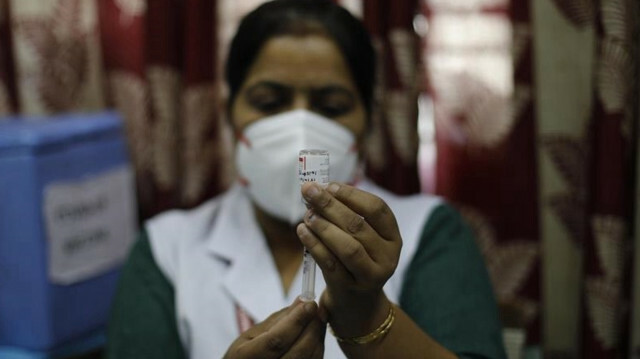
Daily cases cross 141,000 mark with omicron emerging as dominant strain
India is now facing the third wave of COVID-19 and the government needs to remain alert to ensure that the health system is not overrun, health experts and observers say.
The country's daily COVID-19 cases crossed the 141,000 mark on Saturday as many Indian cities continue to see a spike in infections. With this, the tally of cases in the country has reached 35.3 million.
Meanwhile, with 285 more deaths, the fatalities have risen to 483,463 nationwide.
Health Ministry officials say omicron is the predominant strain circulating in Indian cities, however they have not declared that the third wave is setting in.
"Given the rising numbers now, we need to prepare our health systems and remain alert to deal with any kind of situation that may arise. The situation looks alarming and there is no doubt that it is not a third wave. We just need to deal with it now," top Indian public health expert Rajesh Kumar told Anadolu Agency.
Noting that the sudden spike in cases was because of the omicron variant, he said the infection caused by this variant is less severe . But if the number of cases rises exponentially, hospitalizations could also increase and we must remain prepared for this, he added.
The Health Ministry figures reveal that the country's commercial capital Mumbai and national capital New Delhi reported the most cases.
During a news conference on Wednesday, Health Ministry officials said that the country has reported more than a 6.3% increase in cases in eight days and there was an increase in the case positivity rate from 0.79% on Dec. 29 to 5.03 % on Jan. 5.
- Holiday season
Himanshu Sikka, associated with IPE global, an international healthcare development consultancy, said that year-end celebrations have definitely pushed India into the third wave.
"There is increasing evidence on omicron based community transmission. In the next couple of weeks we could see the numbers rising dramatically and may reach a million positive cases per day by the end of the month," he said.
He also noted that there is a likelihood that while the virus spreads it may not lead to high official numbers, because of several factors. "Testing rates in India are not that high and given the majority of people are expected to remain asymptomatic or with mild symptoms, many of them may not go for testing," he said.
Last year, India saw a devastating second wave of COVID-19. The daily infection and fatality figures crossed over 400,000 and 4,500, respectively. The deteriorating virus situation then created havoc as hospitals ran out of oxygen supplies and the health system was overwhelmed.
Health experts say the third wave may not be as severe.
"A third wave is imminent but the combination of past exposure, climbing vaccination coverage rates, and low reported severity of omicron infections should hopefully result in a more muted problem than we saw during the second wave. I don't see any reason why an omicron-driven wave in India would be more dangerous than in other countries,” Professor Ramanan Laxminarayan, director of the Washington-based Center for Disease Dynamics, Economics and Policy, told Anadolu Agency.
He said that India is well prepared with oxygen, which was a major gap the last time around. "But we should certainly be careful to make sure that the health system is not overrun," he said.
Indian Prime Minister Narendra Modi last month said the country has 1.8 million isolation beds, 500,000 oxygen-supported beds, 140,000 Intensive care units beds, 90,000 Intensive care units, and non-intensive care units beds, especially for children.
- More vaccination
Experts also say that the country should push for more vaccination. "It’s largely going to be a wait and watch game for now. Keep pushing for vaccination, Covid appropriate behavior, keep new, medicine regimens ready, etc., and watch out for early signs of when things start going out of hand. At the same time keep the optimistic hope that this third wave will lead to herd immunity without much damage," said Himanshu.
According to government data, over 60% of India’s eligible population has been vaccinated against COVID-19. As of Saturday morning, 1.50 billion doses have been administered so far to the country of some 1.4 billion people.
What has now triggered more worries are the big political rallies that are happening in the poll-bound states. Five states will go to polls, this year and political parties are now deploying leaders to the campaign, even though the numbers are shooting up quickly.
Delhi Chief Minister Arvind Kejriwal, who led a local election victory march in northern Chandigarh city, was seen without a mask. A few days later, he announced that he has tested positive.
"Containment of the spread is going to be very difficult given economic and political compulsions (elections) unless there is an unprecedented spike in hospitalization rates," said Himanshu. "Given the way the virus has behaved and impacted elsewhere, by the time our hospital beds start saturating, it will anyways be too late to contain anything."
Hello, the comments you share on our site are a valuable resource for other users. Please respect other users and different opinions. Do not use rude, offensive, derogatory, or discriminatory language.
The floor is all yours.








